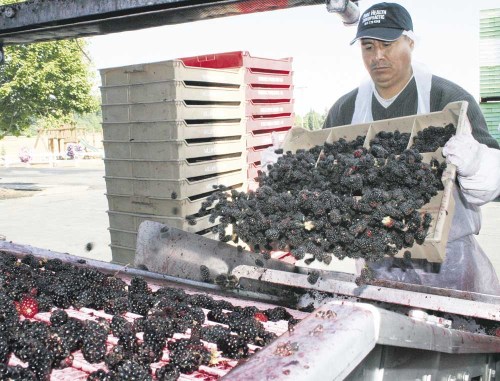Oregon farmers urge tax exemption for processed crops
Published 4:15 pm Monday, February 13, 2023

- A worker empties flats of blackberries onto a conveyor for processing. Oregon lawmakers may include crops sold to processors in a tax exemption for farm products shipped out-of- state by brokers and wholesalers.
SALEM — Crops sold to Oregon processors for out-of-state export could avoid the state’s corporate activity tax under a proposal to expand an exemption now limited to brokers and wholesalers.
Four years ago, lawmakers imposed a new tax of $250 plus 0.57% on sales above $1 million in the state.
The tax doesn’t apply to revenues from crops shipped out-of-state by brokers and wholesalers, but farm products sold to processors aren’t currently covered by the exemption. Since crops are often commingled, the tax exemption is based on the proportion exported by the broker or wholesaler, or on the industry-wide average.
Agriculture groups are urging lawmakers to pass House Bill 2142, which similarly excludes crops exported by processors, arguing the current system puts Oregon processors at a disadvantage.
“When selling our crops and commodities, I really would rather sell out-of-state,” said Janice Flegel, whose family farms near Prineville, Ore. “And that’s kind of sad but it’s a reality.”
Flegel pointed out that her family farm currently pays the CAT on sales over $1 million even if it’s operating at a loss.
“The CAT tax affects me daily,” she said. “Anytime I buy supplies or parts, I have to pay the CAT tax.”
Supporters of HB 2142 explained that the current exemption creates tax disparities among farm sectors, even among crops bound for export.
Duyck Family Farm primarily grows blackberries, blueberries and grass seed, though it’s also produced wheat and other types of seed.
Currently, wheat and seed crops can be excluded from the CAT but fruit crops cannot, said Jacqueline Duyck-Jones, whose family operates the farm. Blackberries processed in Oregon are subject to the tax even though 99% are ultimately shipped out-of-state, discouraging the farm from expanding production, she said.
“We have no bargaining footing for our fruit sold to processors to offset our tax,” Duyck-Jones said.
Hazelnuts are taxed differently depending on whether they’re intended for the in-shell or kernel markets, said Bruce Chapin, a grower near Keizer, Ore.
The tax exemption applies to in-shell hazelnuts but not to those sold for kernels, since they’re considered to be processed, he said. That’s consequential because fewer hazelnuts are sold in-shell, owing to trade tensions with China and changing market dynamics favoring kernels.
The tax imposes another burden on farmers who’ve paid more to grow the crop than it’s worth, due to higher fertilizer costs and lower hazelnut prices, he said.
“In my 50 years of farming, this is the worst year I’ve seen,” Chapin said. “And on top of this loss, to add insult to injury, there will be a CAT tax to pay.”






